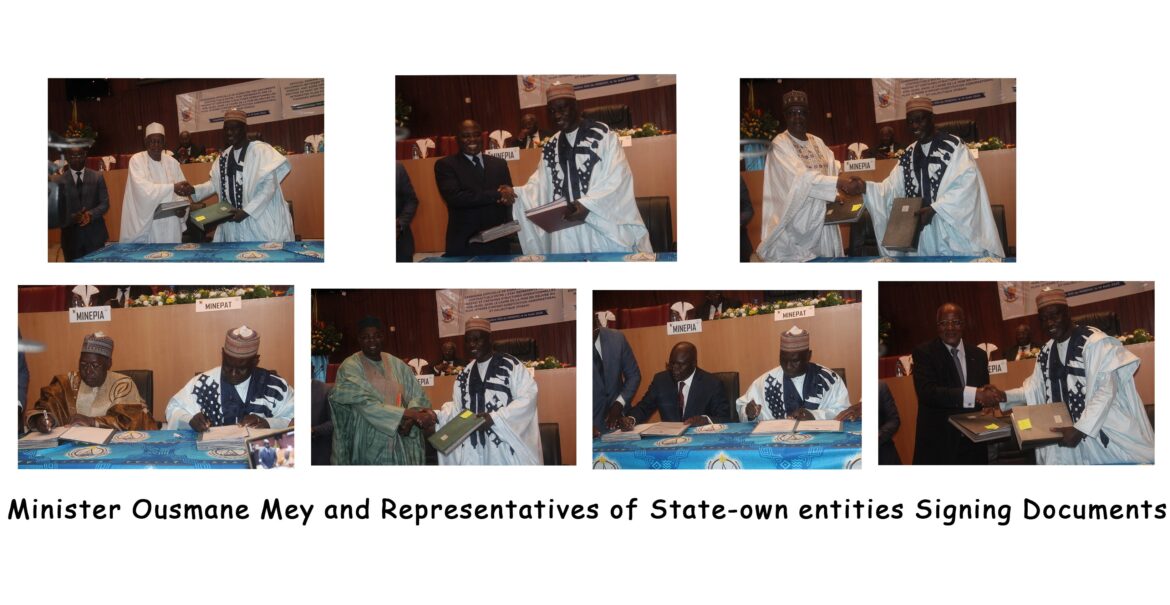By Etienne Mainimo Mengnjo
The government of Cameroon has allocated more than FCFA 13 billion to State-owned entities as part of the implementation of the Integrated Plan for Agro-Pastoral and Fisheries Import-Substitution (PIISAH).
The agreement was formalised during a signing ceremony recently in Yaounde between the government, represented by the Minister of the Economy, Planning and Regional Development, MINEPAT, Alamine Ousmane Mey, and the director generals of the beneficiary entities. Minister Ousmane Mey was accompanied by the Ministers of Agriculture and that of Livestock.
These state-owned entities include the Cameroonian Bank for Small and Medium Enterprises (BC-PME SA); the Agricultural Products Development and Exploitation Company (SODEPA); the Institute of Agricultural Research for Development (IRAD); the Upper Nun Valley Development Authority (UNVDA) Ndop, Office Lere, VIVA Logone and VIVA Benoue.
Speaking at the signing ceremony, Minister Ousmane Mey said the allocation is in line with the Head of State’s vision, which emphasizes the importance of developing strong import substitution policies.
Despite the negative trade balance often incurred, the minister indicated that in the last two or three years, there has been a change in trend regarding production and a reduction in the trade deficit.
“This is certainly the outcome of this important policy promoted by the state, and we want to encourage all these structures involved in implementing this policy to ensure that Cameroon reinforces its food supply sovereignty,” Minister Ousmane said.
He added, “It should also be able to maintain food security, and we should develop the capacity not only to supply our local and national markets but also to export to other destinations, because Cameroon has this capacity.”
To all the managers present at the signing ceremony, the Minister said, “We should continue our journey toward achieving the ultimate goal of our import substitution policy, as requested by the president of this republic, His Excellency Paul Biya. Cameroon is a blessed country.”
According to the Minister, Cameroon has the potential not only to supply its local and national markets but also to export its products based on the huge potential we possess. He added, “This is certainly the wish of the president of the republic. This is also our commitment at the government level, and we will achieve the set goals with your contribution.”
Amadou Haman, DG of BC-PME SA, said this support is timely for the bank, which in its new strategic repositioning toward its branches, obtains substantial resources to be made available to the private sector in the areas mentioned earlier by the Minister.
“This fundamentally relaunches the bank in a new orientation, more in line with its objectives and practices. This is roughly what I can say about this convention signing ceremony,” he said.
To Eric Akongnui Andangfung, Deputy General Manager of UNVDA Ndop, the document signed with the Minister of MINEPAT will help support the activities of UNVDA, namely the building of some bridges and the purchase of equipment to enhance agricultural production and supervision.
“It is going to increase our output because we are now going to build canals and open up those that are blocked, which will enhance productivity and output,” Eric Akongnui said.
According to information, the signing ceremony of the contractual documents between the state, represented by MINEPAT, and certain public entities marks an important step in the implementation of the Integrated Plan for the Substitution of Agro-pastoral and Fisheries Imports (PIISAH).
This plan aims to reduce Cameroon’s dependence on imports of agro-pastoral and fisheries products by promoting local production. PIISAH is an ambitious government program aimed at transforming the Cameroonian economy by encouraging local production and import substitution.
The objectives are to reduce Cameroon’s dependence on imported agricultural and fisheries products, stimulate local agricultural and fisheries production to meet domestic demand, create jobs and stimulate economic growth in the agro-pastoral and fisheries sectors, as well as improve Cameroon’s trade balance by reducing imports and increasing exports of local products.

